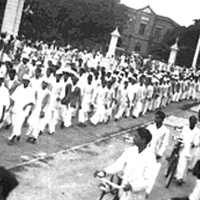The All India Congress Committee passed its ‘Quit India’ resolution on August 8, 1942. The demand was to declare India immediately as an independent country. Then a provisional government would be formed with the cooperation of the major parties whose primary duty would be defence of India and resistance against aggression. The provisional government would also form a constituent assembly for preparing the Constitution for the federation in which the units would enjoy largest measure of autonomy.
On August 9 all Congress leaders were arrested and Congress was declared an unlawful body all over India. As a result violence broke out in all Hindu majority provinces. Railway stations were burnt, telegraph wires were cut, post offices were looted and hundreds of people were killed before the order was restored. The Depressed Classes kept themselves separate from the movement and their leader Ambedaker strongly criticized Congress. The Indian Nationalist condemned Ghandhi for his action, Sapru and Jayaker also expressed their disapproval, the Communist Party of India also opposed it. Bhai Permanand the vice president of Hindu Mahasbha criticized the ‘Quit India’ scheme and on August 10, Savarker the President of Hindu Mahasbha asked his followers to stop supporting the Congress campaign. The Working Committee of Majlis-i-Ahrar said that such type of movement was unnecessary and inadvisable at the present critical situation.
The Muslims became all the more certain that this movement, on the face of it, directed not only at coercing the British Government to hand over power to the Hindus without considering the demands of the Muslims and other minorities also aimed at forcing the Muslims to submit and surrender to Congress terms. The All India Muslim League advised the Muslims to remain aloof from the movement completely. Quaid-i-Azam termed the ‘Quit India’ movement as tantamount to “forcing their demands at the point of bayonet” and “internecine civil war”. The movement was started without referring to the Muslim League or any other non-Congress organizations. It was an invitation to the civil war. In Britain the movement was condemned except for some leftist circles. The European and American press also criticized the ‘Quit India’ movement and called it an attempt at a seizure of power by an autocratic minority.
Actually Gandhi was having negotiations with Japan and Jawaherlal Nehru was “thrilled” by the thought of the Japanese invasion of India. So in their attempt to take power from the British, the Congress leaders were not averse to employing tactics, which were hardly respectable and possible. It can also be said that the Congress feared that if independence would be delayed the divided India would become a reality. They wanted to stop the emergence of Pakistan but it’s a fact that in 1947, Congress itself was forced by the events to agree for the division of India.
This article was last updated on Monday, Jan 01, 2007



